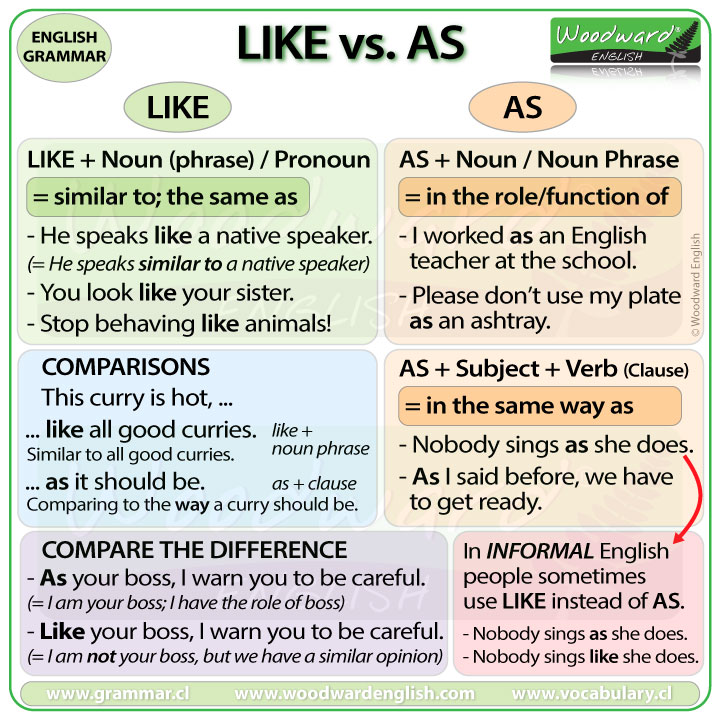Comparing Using Like Or As

Like vs. Equally
English Grammar Rules
We by and large use LIKE and As to make comparisons.
Similar
Like = similar to; the same as.
The structure of the judgement is usually: VERB + LIKE + NOUN / PRONOUN.
- He speaks like a native speaker. (= He speaks similar to a native speaker)
- She looks like a supermodel.
- Y'all look similar him.
- Cease behaving similar animals!
Similar is mainly used as a comparison.
AS
Equally = the way; in the same style; in the same status
The structure of the sentence is usually: Equally + SUBJECT + VERB.
- Nobody sings as she does. (= Nobody sings in the same way she does)
- They went to the party as they were.
- Please don't utilize my plate equally an ashtray.
- As I said before, we have to get ready.
Notice how you could replace Equally with 'the manner' or 'in the same way' and maintain the same meaning.
Information technology is common in American English to use LIKE instead of Equally. However, it is by and large considered informal to utilize it in this fashion.
- We play football game similar champions exercise.
Another utilize of As is to say what the part/position/function of a person/thing is.
- He started work every bit a carpenter.
- She used the tapestry every bit decoration in her living room.
- I worked as an English teacher at the school.
LIKE vs. Every bit
Exist careful, in similar sentences that employ LIKE and AS, the meanings of each sentence are very different. For instance:
- Equally your dominate, I must warn you to be conscientious. (I am your dominate - I am in the part of dominate - REALITY.)
- Like your boss, I must warn you to be careful. (I am non your boss, merely he/she and I accept a similar opinion. - Comparison)
Some other example with different meanings:
- This curry is hot, like all good curries. (Like + Noun Phrase)
= Similar to all adept curries - This curry is hot, every bit it should be. (As + Clause)
= Comparing to the way a back-scratch should exist. Notice how later on AS there is a Discipline + Verb (= a clause)

AS IF
In English language we also utilize as if to make comparisons. However it has a few distinct characteristics to its utilise:
1. The verb afterward As IF is always in the past subjunctive, no matter what tense the judgement is.
2. If the verb BE straight follows As IF, nosotros use were for all personal pronouns.
- He looks equally if he knew the answer... just he doesn't.
(The verbs LOOKS indicates this sentence is in the nowadays – only the verb afterwards Equally IF – knew - is in the past subjuntive).
- She walks as if she were a supermodel.
(The verb after Equally IF – be – has been inverse to were and non was ).
- He boarded the airplane equally if he were a seasoned traveller.
- He spends money as if he owned a bank.
Using Every bit + Adjective + AS
We utilise this construction to talk about people, animals or things which are equal in some way. This is a form of comparing.
- Chris is as tall equally his brother.
Next activity
Effort our interactive game to practise the difference between Like and As.
If y'all found this grammar guide about Grammar in English language useful, let others know about information technology:
Grammar Notes
A multifariousness of English grammar notes and rules including charts and examples for beginner to advanced level students.
Learn Grammar
Grammer Games
Improve your English language with our interactive English language grammer games. There are many different topics and levels.
Play our Games
Comparing Using Like Or As,
Source: https://www.grammar.cl/Notes/Like_vs_As.htm
Posted by: covingtonalivink1991.blogspot.com


0 Response to "Comparing Using Like Or As"
Post a Comment